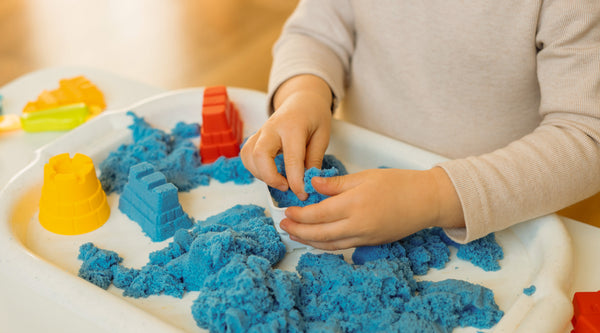How Playtime Can Benefit Your Child’s Development

Playtime is one of the happiest times for children.
But did you know that free play time also helps children with their physical and social development?
As much as you try to provide the best nutrition and the best education to your child, don’t let playtime get in the way.
In today’s blog, we discuss how playtime is a great way to let kids develop and also a way to connect with them.
Have you included playtime as part of your parenting journey? If not, you should try. It’s never too late to start!
What is free play?
Free choice play is when a child decides and controls their play following their own instincts, imagination, and interests.
They play without being led by adults.
There is no right or wrong way to play. Free-choice play improves children’s health, well-being, and development.
By participating in play, children learn about the world and themselves, and they develop important life skills including confidence, self-esteem, resilience, social skills, independence, curiosity, and the ability to cope with challenges .
All these benefits contribute to the overall healthy development of children and adolescents. We will see in detail below how physically, socialand mental development is aided by free play.
Physical development
Physical activities such as running, skipping, and biking help children develop good physical fitness, agility, endurance, coordination, and balance. Although as adults we may not see the point of just jumping around the way children do, these types of play can improve children’s overall physical health and well-being.
They provide an important opportunity for children to acquire physical skills that will help them stay active and healthy throughout their lives.
Social development
Play can help children develop their social skills by providing opportunities to interact with others, listen, pay attention, and share their experiences.
When your child plays, they explore their feelings, develop self-discipline, learn how to express themselves, and process their emotions.


By engaging in social play, children learn how to build relationships, communicate effectively, and navigate social situations. These are all fantastic life skills and it’s great that your child can learn them through play.
Mental development
Free play also gives children the opportunity to explore and aid learning.
When your child fills pots of different sizes with water or makes a pile of mud in the garden or digs up sand on the beach, they are learning.


Children learn a lot through free-choice play. This really sets the stage for formal education and helps them learn faster when in school.
At what age should free play be introduced?
Free play is important for children to develop creativity and use their imagination.
You can encourage young children, including toddlers and preschoolers, to regularly engage in free play, of course, with appropriate supervision. Even babies as young as 6 months can benefit from supervised free play.
How can parents encourage play?
Play is a great way for parents to fully connect with their children and have fun together.
While it is important to support and participate in their child’s play activities, we must also focus on allowing children the freedom and choice to play on their own terms.
When we let our children play, we should try to give children time and space to explore at their own pace.
Although free play is all about letting your child be free, here are some tips to support and encourage free play for your child.
1. Give them a safe environment for free play.
Make sure your child has a safe space to play.


Free play allows children to explore and do things independently, which helps them build confidence and independence.
To ensure your child is playing safely, create a hazard-free play area and check them regularly during playtime.
2. Take cues from your child.
Involve your child in the decision-making process by asking, “What do you want to do now?”
Based on their response, help create an environment where they can pursue their interests.
For example, if they want to build a house, give them building blocks or other materials and give them a safe place to work.


You don’t have to have everything.
Just consider the resources your child will need and find available items in your home.
Don’t be afraid to think outside the box!
So if your child wants to do a puzzle but you don’t have one at home, use a picture or calendar and cut it into pieces so they can be built as an alternative.
3. Support them when needed.
When your child encounters a challenge, you can guide them toward a solution by asking, “What do you want to do? How can we solve this problem?”
Remember that the goal is to provide support and prompts, rather than to do everything for the child.
You can also give some hints or support where children can think for themselves and do things for themselves.
4. Use playtime to bond with your child.
Even when children are playing independently, parents can still participate.
If your child wants to play with you while you’re busy, try suggesting activities they can do on their own.


When they finish, you can review their work together.
With slightly older children, you can ask them to write a story and then read it. This approach can help engage children in independent play and encourage them to try new activities.
In conclusion
Children are constantly learning.
For example, when a child recites a nursery rhyme, they are practicing language development skills. Throwing and catching a ball helps children develop hand-eye coordination skills.
As mothers, we all take our children’s development seriously. While social interaction with peers is important for children, there are also benefits to playing independently.
Let your child engage in free, unstructured play, and let them blossom!
Are you enjoying this post?
Feel free to share this with any mom. Join the community of moms now and receive weekly motherhood tips and tricks straight to your inbox. We’ll occasionally send you updates on new launches and exclusive events, and you’ll always be the first to know.
Shop Lovemère Collection now.





